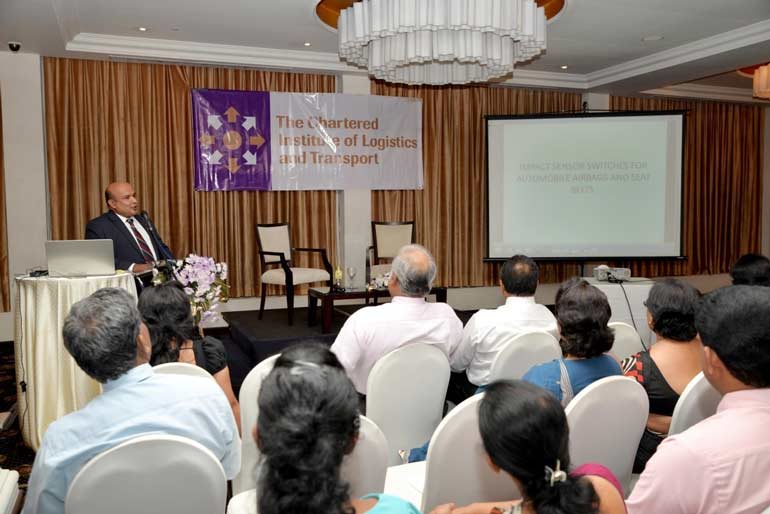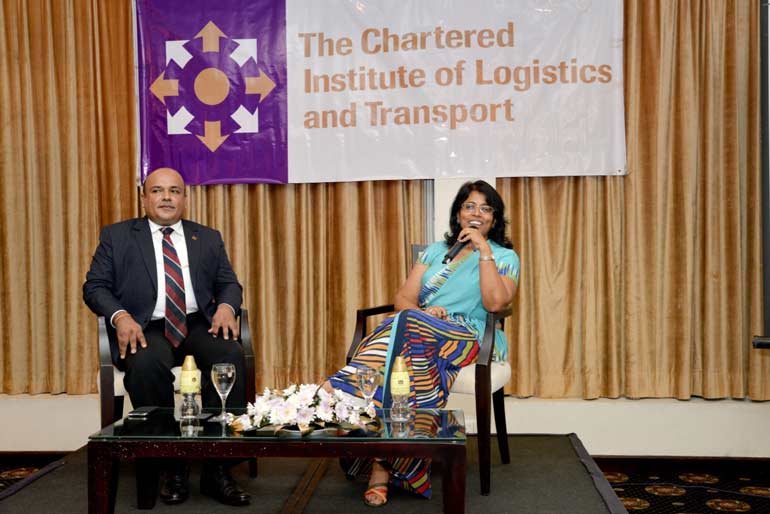Saturday Feb 21, 2026
Saturday Feb 21, 2026
Monday, 25 May 2015 00:00 - - {{hitsCtrl.values.hits}}


The Chartered Institute of Logistics and Transport (CILT) Sri Lanka organised an exclusive corporate partner evening on 19 May. Lanka Harness Company Ltd Executive Chairman Rohan Pallewatte was the guest speaker for the evening. Over 150 representatives from corporate partner companies attended the event.
CILT launched the corporate partnership program in October 2011 and currently they have 16 corporate partners from leading corporates and academic institutions involved in logistics and transport industry. The main objective of corporate partnership program is to develop capabilities of logistic and transport professionals, provide networking opportunities and also to act as a sounding board for the industry and the government, on issues related to logistics and transport industry.
‘Conquering global markets through Supply Chain Excellence’ was the theme for his talk. Lanka Harness Company supplies impact sensors for air bags and seat belts for renowned global automobile companies namely Toyota, Nissan, BMW, Opel, Volvo, Ford, General Motors etc. His customers are in 12 countries and the unique feature of his business is his ability to produce better than six sigma quality product at 1 part per million defect level for the first time in Sri Lanka. He spoke about his business journey and how curiosity and perseverance helped him to secure this business which now accounts for about 7% of the global market share in this product category after struggling for almost a decade to secure the business.
He revealed that many are not aware that Lanka Harness Company’s turnover of 34 million dollar is the highest per employee foreign exchange earner for the country. He enthused the audience by stressing the importance of developing trust and transparency with employees in order to drive a seemingly impossible quality level through ‘acculturation’ – which is the introduction of a foreign culture to a local culture affecting a behavioural change in the local individual, disproving the critiques that Sri Lanka cannot produce high quality precision products to conquer the global market. As customary his talk was followed by a guitar performance enthralling the audience. CILT Vice Chairperson Gayani de Alwis moderated the Q&A session.
The Chartered Institute of Logistics and Transport (CILT) is a leading global professional body associated with the logistics and transport industry. Established in UK in 1919 and having received the Royal Charter in 1926, the institute has an exciting history but is always adapting to stay consistent with current logistics and transport issues. The institute holds unparalleled international recognition and works towards achieving its objectives of promoting and encouraging the art and science of logistics and transport through its membership and its educational qualifications. CILT SL began functioning as an independent territory of CILT from 2013.
This enables CILT SL to act as the authority to elect its own membership and to determine and enforce conditions for admission of members. It is also authorised to accredit educational institutes and conduct educational programs. With a global membership of over 33,000 from 32 countries across the Globe, CILT provides a professional identity to those in the ever expanding logistics and transport sector. It is a strong, active and a unified professional association that is able to speak with authority on strategic issues affecting businesses and people in the industry and support their careers.
CILT SL’s 16 corporate partners are Abans, Aitken Spence Maritime Ltd., Ceyline Holdings Ltd., Diesel & Motor Engineering Plc, Freight link International Ltd., Finlays Cold Storage Ltd., Hayleys Advantis Ltd., John Keels Logistics Ltd., Lanka Shipping and Logistics Ltd., Mclarans Holdings Ltd., Sathsindu Ltd., National Transport Commission, Civil Aviation Authority, Sri Lanka Ports Authority, University of Moratuwa and Sri Lanka Institute of Information Technology.